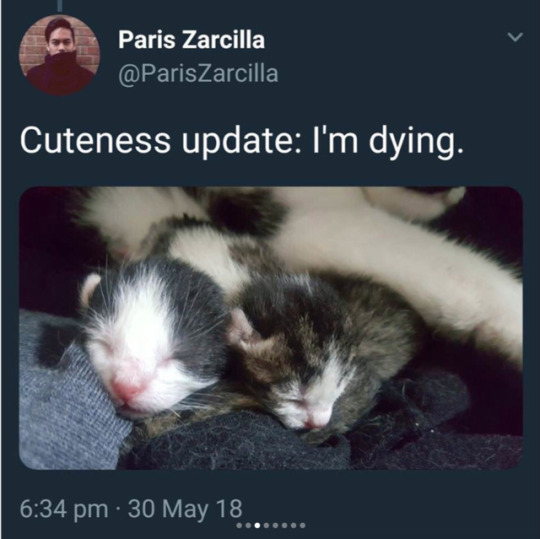Text
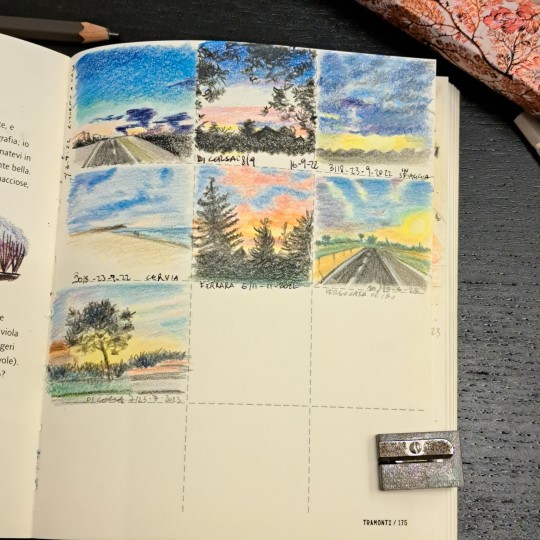
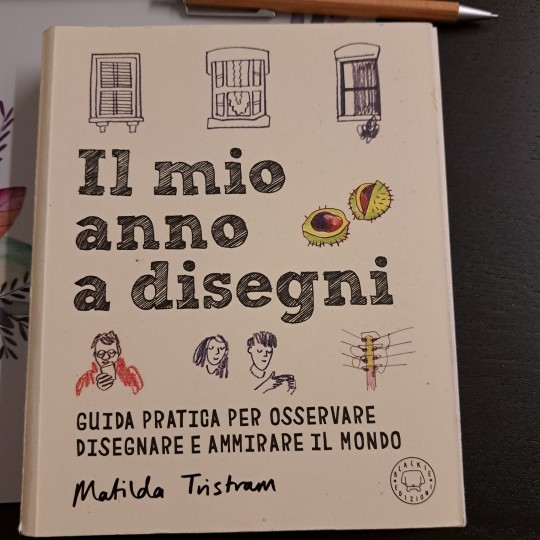

Un anno fa ho cominiciato a riempire di disegni questo libro, l'idea era di provare a ritagliare un pezzettino di ogni giorno da dedicare a una cosa che amo fare. Non sono sempre riuscita a farlo, né a seguire le indicazioni dell'autrice del libro, che prevede alcuni soggetti anomali per far sperimentare (tipo le tubaure) e una griglia di quadratini (uno per ogni giorno, appunto) per mantenere piccoli e idealmente rapidi i disegni.

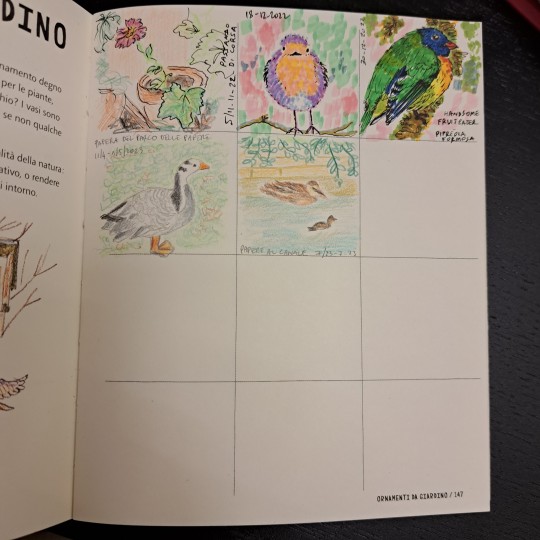
Io ho allargato o convertito alcuni temi, includendo per esempio degli animali e dei fiori e ho sconfinato a volte per avere un rettangolo anziché un quadrato, e penso che continuerò a piegare le regole un pochino, perché alcune pagine le ho quasi finite mentre altre sono ancora vuote.

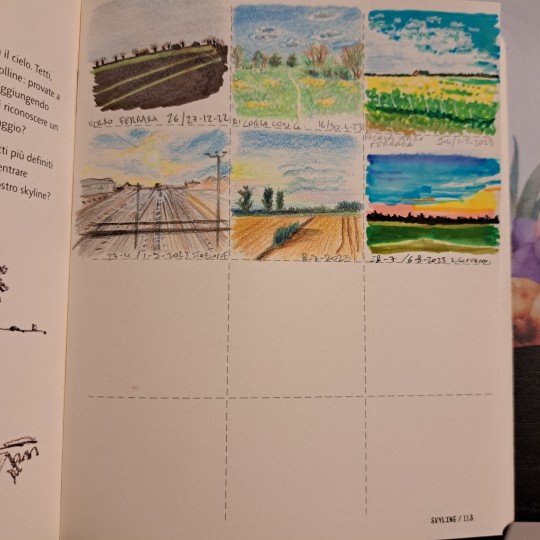
Vorrei disegnare di più dal vivo e finora ho sfruttato youtube per sperimentare dei ritratti da persone in movimento, voglio provare anche con gli animali.
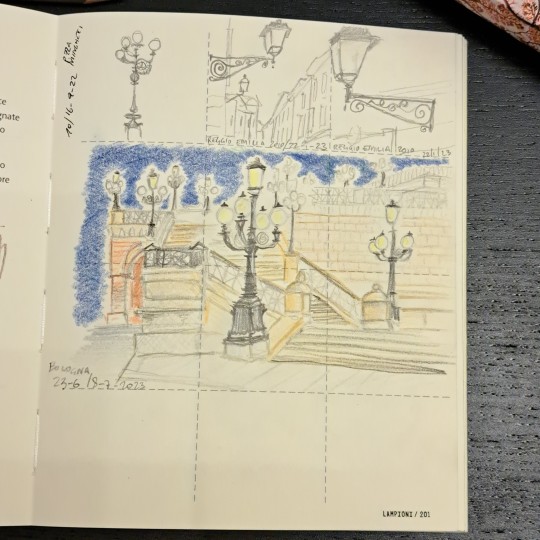
Vorrei anche sperimentare di più con i pennarelli e le penne e qualche acquerello, anche se la carta di questo libro non è molto adatta, però potrei incollare sul retro delle pagine piene, dato che disegnarci sopra rovina i disegni fatti coi pastelli che sto usando principalmente. Sono riuscita a disegnare anche con una mano sola in questi giorni di braccio rotto, tenendo ferme le pagine con un altro quaderno, e ho inserito nella pagina delle composizioni involontarie le mie scomposizioni involontarie e in quella dei vestiti estivi il tutore che spero di togliere presto.

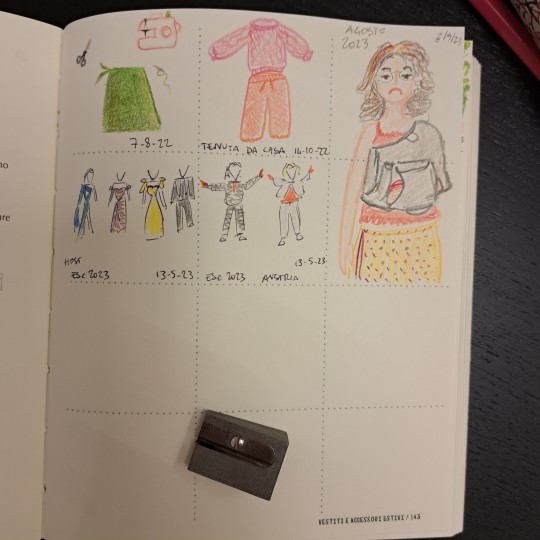
In questi giorni ho fatto delle foto per ricordarmi a che punto sono arrivata a un anno di distanza e vedremo cosa riuscirò a combinare nei prossimi mesi. È stato un bel modo di tenere traccia delle mie giornate o di ricordare alcuni momenti speciali ripescati tra le vecchie foto. Insomma, nel complesso direi che l'esperimento sta riuscendo.
47 notes
·
View notes
Text
E poi ci sono quelle sere dove sembra tutto più o meno normale e lo sai solo tu che non lo è o comunque lo immagini che non lo sia, perché non dovrebbe essere normale essere così, o forse sì ed è la normalità anche degli altri perché siamo tutti sul confine di una crisi di nervi ma gli altri sono più bravi a nasconderlo. Ho troppe cose nella testa, troppi pensieri futuri presenti e passati, troppi desideri e troppi freni, troppe passioni e troppo poco tempo, ogni tanto le onde si alzano e mi sembra di straripare, ogni tanto sembra tutto calmo e invece sta montando sotto e oltre un vortice che mi tira e mi sbatte. Ci vorrebbe trasparenza, ma non sono sicura di riuscire a parlare senza ferire e non sono sicura di quali parole siano giuste per comporre certi pensieri e alla fine rimando e rimando e evidentemente nella mia testa qualcosa si muove per conto proprio e mi arriva la botta emotiva a sorpresa, alla fine di una telefonata o di un messaggio. Chissà se riuscirò a mettere più pace dentro di me. Forse dovrei accettare alcune realtà per come sono ma non riesco a capire come fare e se voglio davvero farlo. Mi sembra una resa, mentre magari sarebbe solo amore per me stessa. Non so quanto tempo dovrò e potrò dare ancora al tempo. Non so nemmeno quali siano i confini della mia autonomia in tutto questo, ché spesso mi sembra di cercare di controllare qualcosa che non è in realtà nelle mie mani e non lo sarà mai e non dovrebbe in effetti esserlo. Vedremo. La vita è strana.
1 note
·
View note
Photo

Vintage Map of Italy (c.1891) with modern shading added.
by u/visualgeomatics
515 notes
·
View notes
Text
Mi sono ritagliata un altro spazio in vista della tesi. Proviamo. Vediamo. Speriamo.
Partenza?
Mi serviva un posto dove mettere i pezzi, i ritagli, i tasselli di questo mosaico che vorrei costruire. Non so se ci riuscirò, nei tempi che ho a disposizione. Non so se riuscirò a trovare il filo e a seguirlo fino in fondo. Vedremo. Intanto qui raccoglierò e terrò insieme e forse da tutti i miei pensieri sparpagliati verrà fuori qualcosa di utile.
1 note
·
View note
Text
Il disordine del dopo e del durante e del sempre
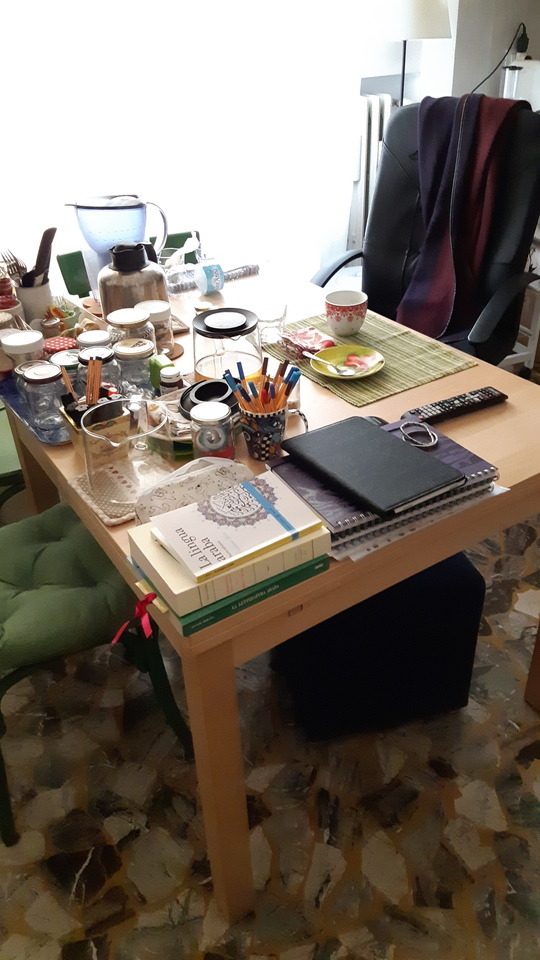
Ieri ho voluto immortalare la mia scrivania prima di rimettere in ordine. Poi non ho rimesso in ordine, ma questo è un altro punto. Il punto di ora, anzi, di quando ho fatto la foto, è che ancora una volta sul tavolo ci sono pezzi di me che mi rappresentano in tanti dei miei aspetti di ora. Non capita spesso di avere in una inquadratura così tante sfaccettature in vista, così tanti pezzettini del mosaico tutti insieme.
Ci sono i resti del mio esame di lingua e letteratura araba: quando sono tornata ieri e ho fatto la foto avevo appena sostenuto l’orale ed ero euforica e imbarazzata allo stesso tempo, come mi è successo anche per l’altro esame che ho fatto quest’estate. E’ andata bene, è andata alla grande, anzi, ma non posso fare a meno di sentirmi inadeguata nei panni della studentessa ormai. Mi piacerebbe poterci rientrare e farli di nuovo miei, al 100% delle mie forze, ma non è più questa la mia realtà e ormai l’ho accettato. Fa un po’ male, ma la nostalgia è una vecchia amica, ormai so che quando mi viene a trovare è bello perdersi in chiacchere, magari fare un piantino, qualche risata e poi salutarsi senza troppe remore. Intanto per quel che posso, non sarà il 100% ma comunque qualcosa ancora posso investire. Prossimo passo: Storia della Cina dell’ultimo secolo, mi devo inventare una tesina in due settimane e se ci penso mi viene di nuovo l’orticaria, quindi per oggi meglio se non ci penso e mi metto direttamente a leggere qualcosa di utile e vediamo che riesco a trovare.
La mantella sulla sedia me l’ha regalata una mia cara amica per il compleanno. In questi giorni l’ho usata spesso, sia per tenermi caldo dato che in questa casa il riscaldamento non è granché, sia per tenermi conforto (oltre che per fornirmi spunti per immedesimarmi nel ripasso della poesia tradizionale araba del VII secolo) Anche i due braccialetti appoggiati sui libri sono regali porta-conforto: ieri nei parlavo con i miei, uno me lo regalò un’amica di mia mamma qualche giorno prima del mio primo esame all’università e siccome si abbinava all’altro, che era il primo regalo del mio fidanzato, li misi in coppia in occasione di quell’esame e da allora mi hanno fatto compagnia ad ogni appuntamento universitario. Non sono portafortuna, sono porta-conforto, nel senso che quando sono nervosa li guardo e mi viene da ridere pensando che mi prendo troppo sul serio e non casca il mondo se qualcosa va storto ad un esame, sono altre le cose che è bene cercare di mantenere dritte.
Tutti i barattoli di vetro e le caraffe e compagnia sono i pezzi della me che cerca di prendersi cura di sé stessa, che cerca di mangiare decentemente, di bere abbastanza, di rendersi comoda la gestione di una casa che è sempre perennemente in disordine e che a volte purtroppo sfora anche il limite della mia sopportazione, che è decisamente fin troppo allenata. C’è sempre un domani, c’è sempre un’altra cosa a cui dare la priorità, ma a volte mi rendo conto che non mi fa bene, che non mi sta bene, che non è una questione di principio, ma una questione di sanità mentale, di pace mentale e che la priorità deve diventare quella, in qualche modo. Che devo ancora trovare, evidentemente.
Nella foto non si vedono, ma da qualche parte ci sono pure dei blister di ibuprofene. Sono tre giorni che ho bruciore alla gola e sono perennemente circondata da qualcuno che si è ammalato o si sta ammalando, a lezione, in ufficio: mi sono presa un po’ di ibuprofene e pensavo fosse lo stress. Ieri sera brividi. Sarò stanca, mi dico. Stamattina mi sentivo un po’ di febbre ed ero indecisa se andare al lavoro. Sono andata dal dottore, più per parlargli dell’orticaria che della gola, ma lui ha quasi fatto un passo indietro quando mi ha visto la gola e mi ha detto “Antibiotico subbbbbito!!!”. Che brutto essere fuori forma. So bene che ci sono cose ben peggiori di cui stare male, ma questa cosa che la mia reazione allo stress è così fisica è frustrante per me. Forse è un circolo vizioso? Forse ho solo troppe faccende irrisolte.
In questi giorni di ripassi e tempi strutturati mi sono riguardata Hip-Hop evolution e ho recuperato le ultime stagioni di Elementary. Da cui i telecomandi e il tablet per il Chromecast, oltre che per le mille traduzioni dall’arabo con google translator e le mille ricerche dei testi delle mu’allaqat e di qualche altro esempio di rime arabe del V e VI secolo. Mi sono tolta la soddisfazione di accennare al mio prof dei parallelismi tra i primi artisti hip-hop e i poeti preislamici, ma mi ci vorrebbe un po’ di tempo e spazio ed energia per andare oltre la suggestione e costruire un discorso sensato. Mi manca costruire dei discorsi sensati su ciò che vedo, su ciò che leggo. Mi manca Serialmente, mi manca dedicarmi a quel genere di analisi, mi manca quel genere di discussione. Dopo la Cina, chissà.
Ultimo indizio, ma non per importanza del significato, la seconda tovaglietta ripiegata in fondo, che testimonia la necessità di apparecchaire per un ulteriore inquilino. Finora è stata una conivenza part-time, un part-time più che altro notturno e finesettimanale, ma forse nei prossimi mesi questa cosa cambierà. E se devo essere onesta, ma proprio onesta, tra le faccende irrisolte non è mica in fondo alla lista. Vedremo.
1 note
·
View note
Text
Getting Stuff Done: How to Deal With Lack of Motivation
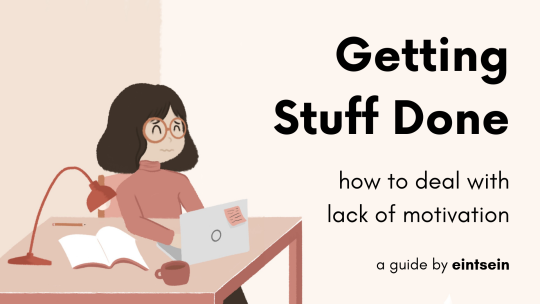
“How can I stay disciplined?”
“How can I get things done if I don’t feel like doing them?”
“How can I overcome my lack of motivation?”
As a college student who has had their fair share of being absolutely unmotivated to do anything, I know it can be hard to get things done if you don’t feel like doing them. Luckily, there are some things you can do to become more motivated to finish your homework, write your paper, study for your exam, or whatever tasks you have on your plate.
Part 1: Increasing motivation
Break up your tasks
Just thinking about one huge task is going to intimidate you so much that you’d rather leave it till later, when the urgency of time pushes you to complete it, than start now.
Breaking up your big tasks into smaller ones will make your tasks seem less daunting. Since you won’t be as intimidated by the amount of effort it might take to complete these tasks, you’ll be more likely to start doing them.
For studying, this can be something like ‘make flashcards for units 1-3’ or ‘practice past exam papers: 2015 + 2016’. For writing papers, this could be writing an outline, doing research for each point of your outline, writing the first 3 paragraphs, etc.
Working on small tasks at a time will also make you less prone to distractions since you only need to focus for a short length of time.
Make small goals and reward yourself
These goals could be accomplishing one of the smaller subtasks above, or achieving a certain grade on a practice test, or finishing a section of your study plan - as long as you’re working towards something.
The rewards? Maybe going out to eat, watching something, or even just time off. Hopefully these rewards will motivate you to complete your task.
I know some people are more inclined to do their work if they’re punished for not doing it, rather than rewarded for doing it, so if you wanna take the ‘punishment’ approach, you could do something like not allowing yourself to use social media until you finish a set of tasks - this is essentially the same thing, just thought about in a different manner. However, you should always be careful with these punishments/restrictions, because sometimes they can end up harming your health and productivity (e.g. ‘I can’t take a break until I finish all of my homework’).
Part 2: Not relying on motivation
Of course, you can’t always expect yourself to be motivated all the time. In fact, it’s very ineffective to rely on motivation to get things done; motivation is fleeting. Here’s an alternative: self-discipline. But how does it work?
Establish a study routine
Humans are creatures of habit. Even if you’re a P-type (like me), habits are hard to break. So making a habit of accomplishing your tasks/studying at a set time every day will help you, well, accomplish them. For example, it’s a lot easier to get your homework done every day if you do it at the same time - e.g. once you come home from school - rather than doing it ‘whenever you have time’.
Having a study routine will also make you less likely to be distracted since you know that that period of time had a purpose. If you’re trying this out for the first time, you might wanna completely get rid of distractions so that you can focus (e.g. putting your phone in your bag, on silent). However, with practice, I found that my phone or any other sources of distraction don’t really bother me anymore since I’ve had tons of practice resisting the urge to pick up my phone whenever there’s a notification, for example.
Schedule in time for breaks
This ties in well with the point about rewards: the break might be the reward for your studying. However, this doesn’t always have to be the case. You shouldn’t always think of relaxing as merely a reward for studying or accomplishing your tasks, but rather a necessity for the well-being of your mind. This sort of approach to breaks ensures that you actually let your brain rest once in a while.
After taking a break, your mind will be refreshed and revitalized, and you should have more than enough energy to continue with your other tasks.
Some of you asked - with regards to my previous post on The Mandatory Midday Break - how I can limit myself to exactly an hour, and to be honest, the answer is habit. It’s like having a habit of showering at the same time every day and not extend the length of time you spend in the bathroom (except in certain circumstances, like during a day off, I guess).
This is why it’s important to schedule your breaks and establish a study routine or habit - not only does it ensure you get enough rest, but it also prevents you from extending your break so that you don’t become unproductive and leave a ton of tasks unfinished.
It can be hard to motivate yourself to accomplish all your tasks, but there are things you can do to increase your motivation. However, you can’t expect to be motivated all the time, and you shouldn’t rely on motivation to get things done. Discipline and habit are the most important tools you can use to be efficient and productive without having to be motivated.
Hope this post has been helpful, and, as always, feel free to drop me an ask if you have an ask. Have an awesome week :)
14K notes
·
View notes
Photo


Arabic names for your pets : Part 1 (cats)
#arabic#languages#langblr#tongblr#pet name series#vocabulary#cats#cat names#arabic vocabulary#arabic language
270 notes
·
View notes
Photo


Arabic names for your pets : Part 2 (dogs)
114 notes
·
View notes
Text
house furnitures vocabulary list in Arabic (MSA)

سَرِير / فِرَاش (m.) bed (sarir / firash)
وِسَادَۃ (f.) pillow (wisseda)
خِزَانَۃ (f.) closet (khizana)
كُرۡسِي (m.) chair (korssi)
غِطَاء (m.) blanket (ghita’)
ِمَكۡتَب (m.) study desk (maktab)
مِصۡبَاح (m.) lamp (misbah)
مِرۡآۃ (f.) mirror (mira’at)
سَتَائر (pl. m.) curtains (sata’ir)
شَمۡعَۃ (f.) candle (shama’a)
مِزۡهَرِيَّۃ (f.) vase (mezharia)
طَاوِلَۃ (f.) desk (tawila)
أرِيكَۃ (f.) sofa (arika)
سَجَاد (m.) carpet (sajad)
تُحۡفَۃ فَنِيَّۃ (f.) bibelot (tohfa faniya)
لَوۡحَۃ فَنِّيَۃ (f.) tableau (lawha faniya)
مَكۡتَبَۃ (f.) bookcase (maktaba)
تِلۡفَاز (m) television (telfez)
حَاسۡوب (m.) computer (hassoub)
أزۡهَار (pl. f.) flowers (azhar)
مِكۡنَسَۃ كَهۡرَبَايِيَّۃ (f.) vcuum cleaner (miknassa kahraba’ia)
فُرۡن (m.) oven (forn)
ثَلَّاجَۃ (f.) fridge (thalaja)
أوانِي (pl. f.) utensils (awani)
ثُرَيَّا (f.) chandelier (thouraya)
مِكۡنَسَۃ (f.) broom (miknassa)
آلَۃ غَسِيل المَلَابِس (f.) washing machine (alet ghassl al-malabess)
آلَۃ غَسِيل الاوَانِي (f.) dishwasher (alet ghassl al-awani)
387 notes
·
View notes
Text
My Arabic vocabulary masterlist
Vocabulary lists
Fandom vocabulary series MSA
Greetings in MSA
Common sayings (dialect)
Insults in MSA
Baking in MSA
Halloween vocabulary MSA
Mathematics in MSA
Playing cards in MSA
Fairy tales and magical creatures MSA
Days of the week MSA
Unisex names in Arabic
Family vocabulary in MSA
Sweet/flirty words and expressions (MSA)
Dialect learning references
Palestinian dialect
Lebanese dialect
Moroccan dialect
Egyptian dialect
Algerian dialect
Iraqi dialect
Libyan dialect
Sudanese dialect
Saudi dialect (hijaazi)
Syrian dialect
Arabic pet names series
Cats
Dogs
Rabbits
Lizards
Turtles
Birds
Horses and donkeys
General posts and references
Word of the day
Arabic proverbs
Sayings and responses series
Arabic music
Dialect posts
Why are the dialects so different?
Arabic calligraphy information
Arabic reading material for beginners
Arabic audio files
Animated movies in Arabic
Arabic plural dictionaries
Arabic language learning tips
Staying motivated when you self-study
Being gender neutral in Arabic
English sounds that don’t exist in Arabic (MSA)
Untraslatable Arabic words (dialect)
Expressions with the word “Allah”
Asking questions in Arabic
Writing a C.V. in Arabic
963 notes
·
View notes
Note
I'm a bit clueless so forgive me if my questions are a bit stupid, but is learning modern standard Arabic or a dialect more useful? Like generally speaking do people usually use more of msa or their dialect in their daily lives? I've heard a lot about how madrasah students in my country although they learn and may be very fluent in Arabic, they still struggle with communicating with locals in Arab countries because locals use a lot more slang (not sure if its in dialect tho)
Hello,anon!
Your questions isn’t stupid at all, it’s a good question actually.
Standard Arabic is the formal version of Arabic and it’s used in written communications. When speaking to one another, people use their own dialects.
You need to learn the Standard Arabic because it’s important to know the grammar and structure of Arabic, plus, dialects aren’t acceptable in writing, especially formal writing.
Native speakers of Arabic can understand and speak the Standard Arabic so if you only know the Standard Arabic you can still communicate with them, however you might need to familiarize yourself with the dialects spoken by the Native speakers in the place you live in.
The things is, you don’t need to know and speak all the dialects, I’m a Native speaker and I can only speak my own dialect but I understand the other dialects. If I’m speaking with an Egyptian friend, she would speak in her dialect and I would answer in mine and we would still understand each other and have a normal conversation.
For more information, you can check out [this post] about sentence structure in Standard Arabic and how it’s important to help you understand the dialects. There’s also [this post] about the differences between the dialects and [this post] to answer your question about which dialect is the best to learn.
34 notes
·
View notes
Note
السلام علیکم can you recommend any online book shops where books with harakat can be purchased from. I have download the children books which you posted earlier but after hard copies aswell. Thanks
Hi, anon.
You could check out Jamloon online bookshope and Jarir bookshop.
For example :
Dr. Tareq Al bikri has a series of children’s stories that have harakaat, and you can find them on jamloon
You can take a look at the content of one of his books [here] the story starts from “قصص منوعة”.
To get the hard copies, click the links :
1-50 short stories for children [part 1]
2- 50 short stories for children [part 2]
3-50 short stories for children [part 3]
4- 50 short stories for children [part 4]
5- 50 short stories for children [part 5]
6- Gulliver’s travels (with harakaat) // [ebook]
7- The girl and the lion
8- The princess of the golden castle
9- The white mouse
10- Lebleba’s dinars
11- In the island of light
12- The unknown companion
13- The magical lighter
14- The cursed sultan
15- The golden ball
16- The mermaid
The books from 7-16 belong to a series called the green bookstore, I grew up reading these books and I still have them, they’re really good! You can take a look at the books [here] before buying them online.
I’ll update with more books if I manage to find more titles with harakaat
82 notes
·
View notes
Link
Learning Tools:
Quizlet: online learning tool featuring customizable flashcards and vocabulary lists; available online and on mobile devices Memrise: online learning tool featuring customizable flashcards augmented with mnemonics and the spacing effect to boost the speed and ease of learning; available online and on mobile devices Al-Jazeera Learning Arabic: brand new Arabic language learning tool launched by Qatar-based news outlet Al-Jazeera Desert Sky: detailed and clearly organized grammar and vocabulary lists for students of both Modern Standard Arabic and Egyptian Arabic
Vocabulary: 80 Percent Words: vocabulary quizzes of Qur’anic Arabic
Reading: Children’s Library (Arabic): a selection of children’s literature in Arabic available online for free Hans Wehr’s Disciples: a collection of readings/translations, and related vocabulary, grammar and translation insights, from calligrapher/linguist Josh Berer covering all levels of difficulty and different genres Adab: online collection of thousands of Arabic poems, available in both Arabic and English Read Arabic!: Modern Standard Arabic reading materials developed by the US Department of Education; reading lessons aimed at beginner and intermediate students Foreigncy: service for intermediate to advanced Arabic (and Hebrew) students interested in foreign policy in the Middle East; authentic and up-to-date Arabic news articles and vocabulary lists/quizzes powered by Quizlet Nizariat: a collection of poetry and prose from Syrian poet Nizar Qabbani, as well as information on Qabbani himself Arabic Online: resource page for multimedia Arabic learning materials, combining authentic texts and audio/video excerpts with self-graded comprehension questions for Advanced students of Modern Standard Arabic and Egyptian Arabic Princeton Online Poetry Project: small collection of translated Arabic poems with the option of listening to poems read by a native speaker
Audio/Visual: Aswaat Arabia: a collection of videos designed by the University of Texas at Austin for learners and teachers of Arabic seeking materials for listening comprehension; difficulty ranges from beginners to superior Shahid.net: the first free video-on-demand and catch-up website for TV programs in the Middle East; features series, programs, cartoons and documentaries from MBC’s Arabic content JCCtv.net: pan-Arab media organization providing Arab children with high-quality and innovative programs and content Arabic Phone Conversations: a collection of over 300 causal phone conversations in non-standard dialects on a variety of topics and at different difficulty levels; features Egyptian, Iraqi and Levantine conversations as well as corresponding lesson plans Music Layoonak: the largest Arabic music blog, with over 800 songs from over 175 artists from all over the Arabic-speaking world in translation Arabic Webcasts: listening exercises based on real news events, delivered in simplified standard Arabic; aims to be a stepping-stone for Arabic language students from the safety of the classroom to the world of Arabic news broadcasts The Arabic Student: collection of Arabic media collected by an American student of Arabic to help intermediate to advanced students with mainly dialects Arabic on LangMedia: a collection of mainly audio/visual resources for Modern Standard Arabic and a number of dialects
Dictionaries: Hans Wehr: a searchable, online version of the only dictionary serious students of the Arabic language need; search quickly by typing in roots Lisaan Masry: a fantastic, searchable (in both Arabic and English) dictionary of Egyptian Arabic
Moroccan Dialect: Armchair Arabist: a collection of resources, lessons and insights on Moroccan Arabic from an American Fulbright Scholar Speak Moroccan Arabic: a series of lessons in Moroccan Darija, featuring basic expressions, vocabulary and grammar tips Learn Moroccan Arabic: a number of lessons and vocabulary lists for students interested in Moroccan Arabic
Egyptian Dialect: Egyptian Arabic Dialect Course: an online course designed to teach learners of Arabic and introduce them to Egyptian Arabic using examples and vocabulary from the lyrics of songs
Miscellaneous: ACTFL Proficiency Guidelines 2012: Arabic annotations and samples intended to help Arabic teachers, learners, and assessment specialists relate the ACTFL Proficiency Guidelines to the Arabic context and appreciate the various dimensions involved in assessing the four skills in Arabic (Writing, Listening, Reading, Speaking)
2K notes
·
View notes
Photo

Assalamu-Alaykum! This is my very first masterpost, and I wanted to make it about a subject I only know too well. Arabic is my mother tongue and I’ve been into the Arabic culture for like my entire life. I am really eager to help people get more familiar with it, as I understand it might not be easy at all. The letters are different, the spelling is different, the phonetic is different, the culture is different… Thus I really admire people who chose to learn it. You rock!
Anyway, here are the basics (in my own opinion) for learning the language and the culture. I tried to give all the information I had, but I’ll edit this post and eventually add more stuff :
free websites + apps
madinaharabic (the best website really)
salaam arabic (really handy for spelling and phonetic!)
myeasyarabic (the best website to get familiar with grammar & letters)
arabickeyboard (introduces you to not only the language, but also the history and culture of the arabic world)
alison (contains evaluation tests that can help you progress in your learning)
digitaldialects (funny games to help you memorize animals, numbers and colors)
firdaous (really great for vocab!)
as for apps (on itunes), we have AlphaBet Arabe (for alphabet learning), Astrid (motivational app), and Arabic Dictionary
specific arabic learning
egyptianarabiccourse (helps you get familiar with the egyptian dialect)
speakmoroccan (learn to speak the moroccan dialect, aka mine!)
abjadiye (learn lebanese arabic for free)
useful links/docs
arabic verbs
arabic pronouns
arabic alphabet (but also here)
language exchange sources
arabic proverbs (translated in english)
arabic survival phrases here & here
5 beautiful arabic expressions
arabic conjugator
arabic keyboards
lexilogos (i’ve been using it myself for all my essays and presentations)
arabic-keyboard
dictionaries
lexilogos (yup again, but different section)
arabic etymological dictionary (with torrent & word document download links)
arabic dictionary + translator
islamic references
Okay, i hesitated to put that one, but if you want to get into the arabic culture, it is very important to get to know the islamic side of it. (be careful, islamic culture does not necessarily mean arabic culture, but the two can easily be linked)
searchtruth (helps you with grammar and vocab using qur’an sentences)
legacyfordham (it’s the islamic section of the university of fordham website. it gives you a general look on the islamic world eras)
music
maghrebspace (the website is in french though)
hibamusic
arabic radio stations
my top 3 classics (with free download links & online listening)
fairouz
oum kalthoum
abdelhalim hafez here & here
top 10 arabic songs of january 2016
short history of arabic music + top arabic songs of 2015 here
my personal favorite songs
ya rayah - rachid taha (music video + lyric video + english translation)
aatini nay - fairouz (lyric video + english translation)
fi madrasat al hob - kadem saher (lyric video + english translation)
books
easy short arabic stories
popular arabic novels
5 recommended arabic books
YA arabic books listed by genre
my top novels :
al ayyam (trilogy) - taha hussein (pdf of the first tome here)
rihla jabaliyya rihla sa’ba - fadwa touqan
arabic art resources
historiansofislamicart (contains links to each type of art)
metmuseum (history of calligraphy and useful links)
arabartgallery (my personal favorite : all types of art listed by era, and description of each)
a native speaker tips
as I said before, arabic is a tricky language, because it does not originate (like most other popular languages) from latin roots. therefore when you come accross arabic words or names written in latin letters, you’ll find out different ways of writing the same word. any version is correct as long as the pronounciation is correct.
there are no vowels in the arabic alphabet. (well, not really, we have letters referring to “o”, “a” or “i” but we only put them when we stress on those vowels) so arabic letters are referring to consonants, with some of them only existing in arabic (for ex: ض pronounced Ḍād). you’ll probably learn it throughout the websites I gave, but bear in mind that the vowel sounds of arabic are put by tiny symbols above or under the letters called chakl. chakl helps you know how to pronounce a letter, if you should say “a” or “o” or “i” after that letter. in most texts you’ll come accross - apart from language learning websites - you’ll find words and sentences without chakl. and that’s because we, as native arabic speakers, have gotten so used to how a word is pronounced that we kinda know what chakl should normally be put. you should get used to it as well, it will be so much easier for you to read any kind of text.
practice arabic pronounciation and listening A LOT. it will be very useful for writing and reading, trust me.
oh and most importantly, i’m open to anyone desiring to speak with a native arabic speaker! really, you can just message me, or email me (at [email protected]) or whatever you like. i’ll be glad to give you additional tips along the way!
I think I said it all. I may or may not add stuff in the future, so feel free to follow me, or suggest me other things!
I’ll probably do a moroccan masterpost later, ideas are welcome here as well!
5K notes
·
View notes
Text
This is a big, giant list of Youtube tutorials that will teach you all the basic life skills you need to know in order to be a functional adult. There are a lot of important skills that aren’t included in this list, but this should be enough of a basic guide to get you started and prevent you from making a total mess of yourself. Happy adulting! Household Skills:
How to unclog a toilet without a plunger
How to fix a blown fuse
How to fix a leaky faucet
How to clean soap scum from your tub and shower
How to escape from a house fire
How to make a budget and stick to it
How to sharpen a knife
How to clean a self-cleaning oven
How to clean red wine stains from carpet
How to clean blood stains from fabric
How to clean grease stains from fabric
How to do a load of laundry
How to iron your clothes
How to test your smoke detectors
Cooking Skills:
How to tell if produce is ripe
How to know if food is expired
How to properly sanitize a kitchen
How to cook an egg
How to make rice
How to make pasta
How to put out a kitchen grease fire safely
How to use a gas stove
How to use a convection oven
How to cook meat safely
How to use a stand mixer
How to use kitchen knives properly
How to make mashed potatoes
How to make grilled cheese sandwiches
Health Skills:
How to stop bleeding
How to treat a burn
How to do CPR (on an adult)
How to do CPR (on a child)
How to do CPR (on a baby)
How to help someone who is choking
How to save yourself if you are choking alone
How to read a nutrition label
How to treat frostbite
How to recognize when someone is having a stroke
How to maintain a healthy sleep schedule
Mental Health Skills:
How to calm down during a panic attack
How to help someone who is suicidal
How to meditate
How to stop self-harming
How to recognize problem drinking
How to choose a therapist
How to deal with disappointment
How to cope with grief
How to raise your self-esteem
Relationship and Social Skills:
How to apologize
How to cope with a breakup
How to accept criticism
How to deal with bullying
How to argue in a healthy way
How to ask someone out
How to break up with someone
How to recognize an abusive relationship
How to rekindle a damaged friendship
How to speak in public
Job Hunting Skills:
How to tie a tie
How to write a resume
How to write a cover letter
How to dress for a job interview (for women/femmes)
How to dress for a job interview (for men/masculines)
How to properly shake hands
How to nail a job interview
Other Skills:
How to sew on a button
How to hammer a nail
How to change your oil
How to put gas in your car
How to jump-start a car
How to pick a good password
How to back up your files
How to write a cheque
200K notes
·
View notes



